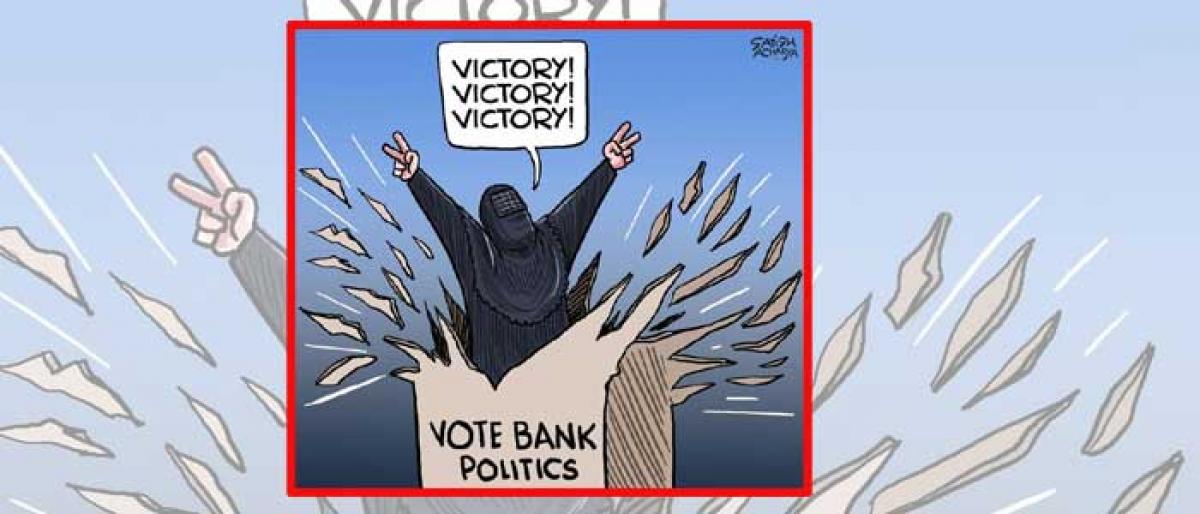Live
- NDA govt is controlling prices effectively: Dinakar
- Jagan govt didn’t pay even kids’ chikki bills: FM
- Bomb Threat at Shamshabad Airport: Passenger Detained, No Explosive Devices Found
- CID probe soon into past irregularities in excise dept
- FiberNet to provide 50 lakh cable connections
- Gold rates in Hyderabad today surges, check the rates on 16 November, 2024
- Gold rates in Visakhapatnam today surges, check the rates on 16 November, 2024
- Fire breaks out at an apartment in Manikonda, no casualties
- Govt successfully implementing Deepam-II: Manohar
- Preliminary probe suggests deliberate arson to erase evidence
Just In

In a landmark judgment, the Supreme Court on Tuesday by a 3-2 decision struck down the centuries-old practice of instant triple talaq among Indian Muslims as unconstitutional, manifestly arbitrary and void in law.
New Delhi: In a landmark judgment, the Supreme Court on Tuesday by a 3-2 decision struck down the centuries-old practice of instant triple talaq among Indian Muslims as unconstitutional, manifestly arbitrary and void in law.
However, the minority judgment concluded that "talaq-e-biddat" was a matter of personal law of Muslims that does not breach the Constitution's Article 25 (right to practice one's religion).
Chief Justice J S Khehar and Justice S Abdul Nazeer constituting the minority in the five-bench Constitutional bench ordered an injunction on triple talaq at least for six months -- by when the government should consider steps to initiate legislation on the issue.
The other three judges disagreed."In view of the different opinions recorded, by a majority of 3:2 the practice of talaq-e-biddat (triple talaq) is set aside," the bench comprising Justices Khehar, Kurian Joseph, Rohinton F Nariman, U U Lalit and Abdul Nazeer said in the concluding para of the 395-page ruling.The apex court gave its judgment on a petition filed by Muslim woman Shayara Bano, joined by a Muslim group and four other women.
Justice Nariman and Justice Lalit, who were part of the majority judgment, said: "Given that triple talaq is instant and irrevocable, it is obvious that any attempt at reconciliation between the husband and wife by two arbiters from their families, which is essential to save the marital tie, cannot ever take place. "...This being the case, it is clear that this form of talaq is manifestly arbitrary in the sense that the marital tie can be broken capriciously and whimsically by a Muslim man without any attempt at reconciliation so as to save it.
"This form of talaq must, therefore, be held to be violative of the fundamental right contained under Article 14 of the Constitution," they said, adding the 1937 Shariah Act must be struck down.
In a concurring but separate judgment, Justice Joseph said: "What is held to be bad in the Holy Quran cannot be good in Shariat and, in that sense, what is bad in theology is bad in law as well." He said he found it extremely difficult to agree with the Chief Justice that triple talaq has to be considered integral to the religious denomination and it was part of their personal law.
He said merely because a practice has continued for long, that by itself cannot make it valid if it has been expressly declared to be impermissible.
He said when issues of such nature come to the forefront, the discourse often takes the form of pitting religion against other constitutional rights.
In his minority judgment, Justice Khehar said it would not be appropriate for the court to record a finding whether talaq-e-biddat was or was not affirmed by Hadiths (Prophet's sayings) in view of the enormous contradictions in the Hadiths relied upon by rival parties.
"Talaq-e-biddat is integral to the religious denomination of Sunnis belonging to the Hanafi school. The same is a part of their faith, having been followed for more than 1,400 years, and as such, has to be accepted as being constituent of their 'personal law'."
"The …. practice cannot therefore be set aside ... through judicial intervention."
The minority judgment observed that there was seemingly an overwhelming majority of Muslim women demanding that triple talaq, "which is sinful in theology, be declared as impermissible in law".
The judges noted that during the hearing, learned counsel appearing for the rival parties described the practice as unpleasant, distasteful and unsavoury. Others called it disgusting, loathsome and obnoxious.
The minority judgment said religion was a matter of faith and not of logic and it was not open to a court to accept an egalitarian approach over a traditional practice.

© 2024 Hyderabad Media House Limited/The Hans India. All rights reserved. Powered by hocalwire.com







